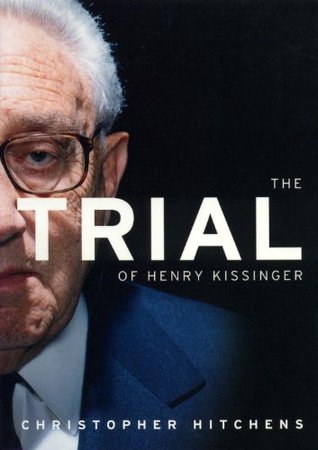Some years ago, in an article about unwritten books that people would like to read, someone selected the yet-to-be-written “Prison Memoirs of Henry Kissinger”. Now aged 90, the chances of Kissinger being tried for his war crimes, much less sent to prison, are rapidly diminishing. However, he has outlived Christopher Hitchens, one of his accusers, who died in 2011 aged only 62. After 9/11 Hitchens quickly became a supporter of the Iraq war and, before his death, intervention in Libya. His volte face even prompted a book by Richard Seymour which he called “Unhitched: The Trial of Christopher Hitchens”.
But in early 2001 Hitchens’ vitriol against US intervention – or support for military interventions by others – in Vietnam, in East Timor, in Bangladesh, and most notably in Chile – was acute, and it focused most intensely on one man, Henry Kissinger. In “The Trial of Henry Kissinger”, published that year, he set out why, rather than receiving the Nobel Peace Prize as of course Kissinger did, he should have been put on trial for his war crimes. The evidence for Kissinger’s knowledge of – and often direct involvement in – bombings, assassinations and coups, is pretty compelling.
In the case of Chile, Kissinger was clearly involved in the plans that led to the kidnapping and then murder of General Schneider, the army leader who stood in the way of a pre-emptive coup against the elected incoming president, Salvador Allende, in 1970. He was part of the group that made Chile’s economy ‘scream’ during Allende’s government and who set the policy that he should be overthrown. After the subsequent coup, he turned a blind eye to Pinochet’s atrocities and tolerated or encouraged Operation Condor, in which opponents of Latin American dictators were hunted down and captured or killed, including in the most blatant case the murder on the streets of Washington DC of Orlando Letelier, one of Allende’s ministers who had survived the coup.
The problem is that much of the evidence is about Kissinger facilitating or permitting crimes rather than directly commissioning them. He was the quintessential man in a suit who rarely takes part in or perhaps even knows the details of the atrocities he tolerates or encourages. The classic case is the bombing of Cambodia, done by B-52s flying so high they could barely see the villages on which they unleashed their bombs, let alone the guerrilla forces camped in the jungle who were the supposed targets. Kissinger seems to have been indifferent to or even pleased by the scale of death and destruction he unleashed, an attitude which Hitchens correctly describes as racist (quite apart from its being a terrible crime).
What is obvious is that indulging and often arming dictators, and hiding the truth not only from people in the US but their elected representatives, was commonplace while Kissinger was National Security Adviser. Those who, years later, were surprised about the Bush government’s manipulation of the evidence against Saddam Hussein, the CIA’s secret torture flights or Obama’s use of drones to summarily kill people who have never been put on trial, can’t have known about (or may have forgotten) what was done in their name by Nixon and Kissinger. Nixon was brought to task, at least for his domestic crime, while Kissinger continued to advise future presidents and to develop his global business for decades afterwards. Even at the age of 90 he offers words of wisdom on Ukraine and other issues. We may wonder whether the person once heralded as the Time magazine “Man of the Year” will be fairly judged by his obituaries. We can be pretty sure, however, that he won’t now be put in the position where he has to fill his remaining years by writing his prison memoirs.


 John Perry lives in Masaya, Nicaragua where he works on
John Perry lives in Masaya, Nicaragua where he works on